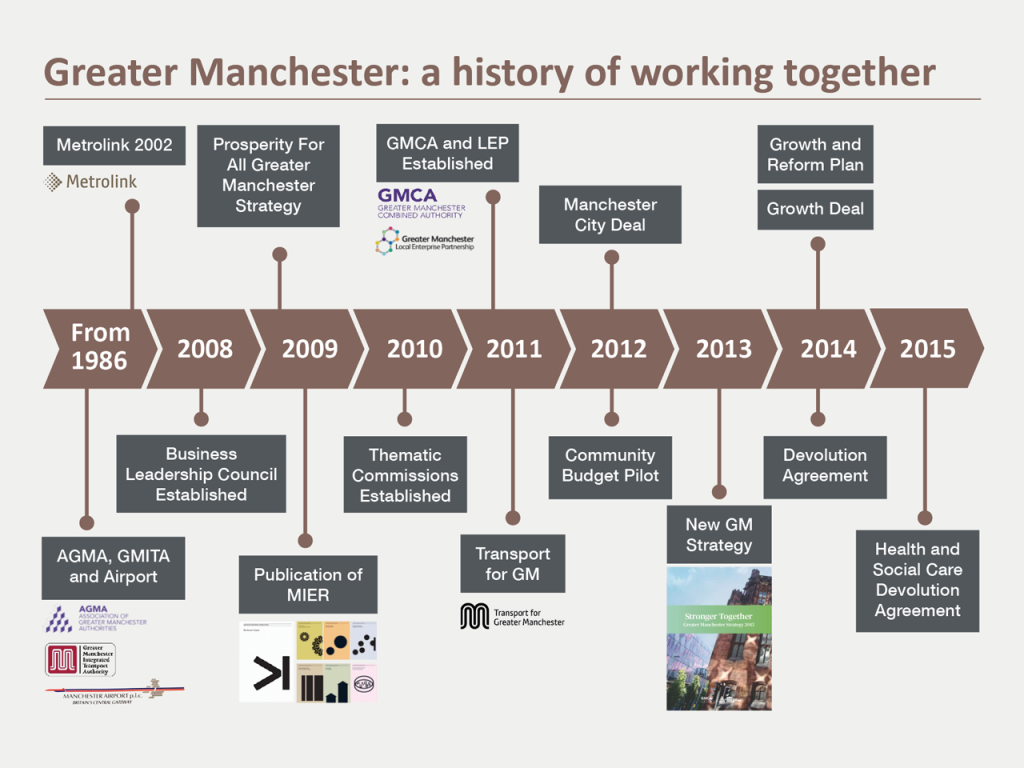Adapted from: House of Commons Library (2015). Devolution to local government in England.
Summary of page
- Greater Manchester is leading the way in devolution in England
- It has had a Combined Authority (leaders of local councils) since 2011
- It has an interim mayor – elections will take place in 2017
- The government will devolve a number of powers and budgets to the mayor to promote coordination and investment in areas such as transport and infrastructure, planning, economic development, training and education.
- The government will devolve powers and budgets to promote coordination of health and social care. But this is not under the control of the mayor.
The Government is in the process of transferring a number of powers and funding streams to the Greater Manchester Combined Authority (GMCA) and other bodies in the Greater Manchester area, together with the creation of a directly‐elected mayor.
Comparing Greater Manchester and Hampshire and the Isle of Wight
The local councils in Greater Manchester have a longer and more established history of working together than the councils in the Hampshire and Isle of Wight (HIOW) region. They formed a Combined Authority in 2011 following collaboration on a number of economic and transport projects. There is no Combined Authority across HIOW.
2.2. The Greater Manchester Agreement ( published on 3 November 2014 )
The Greater Manchester Agreement sets out new powers for the Greater Manchester combined Authority (GMCA) (See also a Written Ministerial Statement at HCDeb 3 Nov 2014 c36-‐7WS ). A directly-elected mayor will be established in 2017 for the whole Greater Manchester area. The elected mayor will receive the following powers and resources:
- A consolidated, multi-‐year transport budget;
- Responsibility for franchised bus services, railway stations, and ‘smart ticketing’
- A Housing Investment Fund of £300m over 10 years (should be self-‐sustaining over time)
- The power to produce a statutory spatial strategy, equivalent to the power of the Mayor of London: this would be subject to unanimous approval by the ‘combined authority cabinet’;
- An enhanced form of the Manchester ‘earn-‐back’ agreement – the GMCA invests in infrastructure and is rewarded by government if local economy grows.
- The elected mayor will also become the Police and Crime Commissioner for GM. (HM Treasury, Greater Manchester Agreement, November 2014, p. 1 )
Meanwhile, the GMCA will receive the following additional powers and resources:
- Devolved business support budgets: the Growth Accelerator, Manufacturing Advice Service and UKTI Export Advice;
- Power to restructure further education in Greater Manchester, plus control of the Apprenticeship Grant for Employers;
- Joint commissioning, with the Department for Work and Pensions, of the next stage of the Work Programme;
- The opportunity to plan the integration of health and social care (see below). (Ibid., p. 1 )
The new elected mayor will be subject to scrutiny by the existing scrutiny committee of the GMCA: the ‘GMCA Scrutiny Pool’, made up of 30 non-‐executive councillors drawn from the ten Manchester boroughs.
An ‘interim mayor’, Tony Lloyd, currently Greater Manchester Police and Crime Commissioner, was appointed to the post (by the existing members of the GMCA) on 29 May 2015 until the 2017 elections.
2.3. Health devolution in Greater Manchester
The Government published the Greater Manchester Health and Social Care Devolution Memorandum of Understanding on 27 February 2015.
A new Greater Manchester Health and Social Care Partnership Board (GMHSPB) will produce a joint health and social care strategy for Greater Manchester. It will have two sub-‐groups:
- a Greater Manchester Joint Commissioning Board (JCB) made up of the 12 Clinical Commissioning Groups (CCGs) in Greater Manchester; the 10 Greater Manchester boroughs; and NHS England.
- an Overarching Provider Forum made up of service providers: acute care trusts, mental health trusts, ambulance trusts, LMCs (local medical committees), and others.
The JCB will commission health and social care services across Greater Manchester on behalf of its constituent organisations, pooling the pooled commissioning budgets of the CCGs and the social care budgets of the boroughs. These budgets make up the bulk of the “£6 billion” that has been advertised as being devolved to Greater Manchester under these proposals.
At local (borough) level, Health and Wellbeing Boards, made up of representatives from CCGs and boroughs, will ensure that health and social care services are provided in a joined-‐up fashion, in line with the GMHSPB’s Strategic Sustainability Plan. The proposals will not lead to a wholesale transfer of functions or funds from the NHS to local authorities, or vice versa. Chris Ham, chief executive of
the Kings Fund, stated:
Devolution to Greater Manchester should enable decisions to be taken much closer to the population being served, with councillors having a bigger influence on future decisions. …The unanswered question is how much freedom public sector leaders will have to depart from national policies in taking greater control of NHS resources.
Chris Ham, “What Devo Manc could mean for health, social care and wellbeing in Greater Manchester” Kings Fund, 2 March 2015
The proposals are to be implemented with a minimum of institutional and legal change.
There is no mention of the elected mayor in the February proposals. The elected mayor will not have any executive or budgetary control over the integration of health and social care. The GMHSPB will
appoint its own chief executive and staff team. An interim chief executive, Ian Williamson, was appointed on 14 April 2015.
2.4. Further proposals: July 2015 budget
The July 2015 Budget made additional proposals for devolution of power to Greater Manchester:
- The Greater Manchester Fire Service will be abolished and its functions transferred to the Mayor. (See HM Treasury, Further devolution to the Greater Manchester Combined Authority and directly-elected Mayor, July 2015, p. 3 )
- A Greater Manchester Land Commission will be established to take a more strategic approach to the management of public sector land.
- The Mayor is to be given powers to introduce Mayoral Development Corporations, similar to those which exist in Greater London; and to make Compulsory Purchase Orders, with the agreement of the borough in which a CPO is made;
- Further discussion regarding joint working between central government and Greater Manchester on children’s services and employment programmes; (Ibid., p. 4 )
- The Government has published a consultation on the devolution of powers over Sunday trading hours to elected mayors and/or local authorities. (DCLG / BIS, Consultation on devolving Sunday trading rules, July 2015 )
The Government also agreed, on 12 August 2015, to pass control over European Union structural funds to the GMCA. (See David Paine, “Greater Manchester to get control of £300m European funding”, Local Government Chronicle, 12 August 2015)

